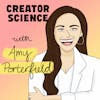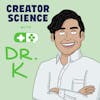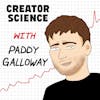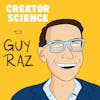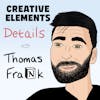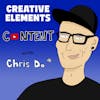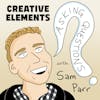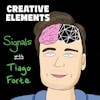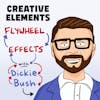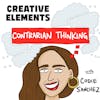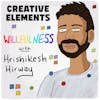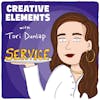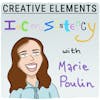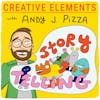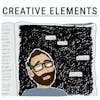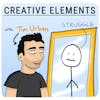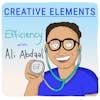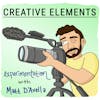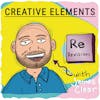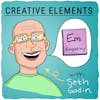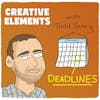
Todd Henry is an author, podcaster, and keynote speaker.
Todd Henry is the author of five books, including The Accidental Creative, Die Empty, Louder Than Words, Herding Tigers, and The Motivation Code. His books have been translated into more than a dozen languages.
He’s the host of The Accidental Creative podcast, which has more than 10 million downloads.
And he’s built one heck of a reputation as an international speaker as well, keynoting more than 30 events per year at times.
In this episode, we talk about how you can become more creative on-demand, honing your intuition, why vine keepers destroy perfectly good grapes, Todd’s Idea Factory, and why Deadlines make his whole creative business run.
Subscribe to Accidental Creative
Full transcript and show notes
***
IF YOU LOVE CREATIVE ELEMENTS
Follow Creative Elements on Instagram
Subscribe to weekly episode emails
Leave a review on Apple Podcasts
***
ABOUT JAY CLOUSE
Subscribe to my newsletter, Creative Companion
***
SPONSORS
Get a free 45-day extended trial of Canva Pro
Get a free month of Blinkist Premium
Get 50% off your first three months of Sendinblue's premium account with promo code CREATIVE
***
FOR PODCASTERS
Enroll in my podcasting workshop
Enroll in my course on podcasting, Podcast Like The Pros
***
PODGLOMERATE NETWORK
This show is a part of the Podglomerate network, a company that produces, distributes, and monetizes podcasts. We encourage you to visit the website and sign up for our newsletter for more information about our shows, launches, and events. For more information on how The Podglomerate treats data, please see our Privacy Policy.
Since you're listening to Creative Elements, we'd like to suggest you also try other Podglomerate shows surrounding entrepreneurship, business, and careers like Rocketship.fm and Freelance to Founder.
Learn more about your ad choices. Visit megaphone.fm/adchoices
Todd Henry 00:00
What good thing needs to go away to something better can be born? How can you create whitespace in your life for innovation to occur because innovation happens in the whitespace. It happens in the gaps in between.
Jay Clouse 00:11
Welcome to Creative Elements, a show where we talk to your favorite creators and learn what it takes to make a living from your art and creativity. I'm your host, Jay Clouse. Let's start the show. Hello, welcome back to another episode of Creative Elements. I hope you had a fantastic holiday. I hope you got some rest. I hope you spent some time with loved ones. And if you're following me on Twitter or Instagram, you may know that Mallory and I have been preparing for our puppy. We had a short trip to Mexico to celebrate a friend's wedding. And then we got back and we picked up our new Golden Retriever puppy, who we named Ted after Ted lasso and this puppy is a handful. Mallory has done an incredible job repairing our home with everything we need and studying how to do good dog training but that little guy is a lot of work. He's taking a nap right now as I'm recording this. I've always been in awe of parents who are creating or running businesses at a high level. And this is only making me more in awe. So even writing this intro took a lot longer than usual. Instead of sitting down for an hour and writing it, I would sit down for a few minutes, take the dog out to pee, try to sit back down, but then sit with a dog while he fell asleep. And it can be really difficult to activate your creativity in a moment's notice. And then try to get the most out of that time what my friend Val calls, Popcorn Time. Being creative on demand is hard for people in all kinds of situations at home and in the workplace. I hadn't even heard the phrase creative on demand until I met today's guest, Todd Henry.
Todd Henry 02:00
So I was actually a creative director for an in house creative team that had a team of fluctuated anywhere from I mean, I think when I started there were a couple of us and we I think we grew to the max of about maybe 40 people.
Jay Clouse 02:14
And while Todd was in that position, as a creative director, he noticed this challenge of even the most creative people needing to be creative on demand. And he also noticed something different about the people who thrived in that environment despite the challenges.
Todd Henry 02:29
You know, we were just in a situation where we had to create on demand consistently every day, you know, we had to come up with great ideas and execute those ideas. We had tight deadlines. And over the course of time, just realized I saw some patterns among some of the healthiest creative pros that I work with that day, for whatever reason seemed impervious to the pressure and the deadlines and just can produce great work consistently over time. And there are others who would, you know, crash and burn and refresh and crash and burn and refresh. And throughout the course of that experience, realize that the ones who seemed impervious to the pressure tended to have some practices, some disciplines in their life that were outside of their work often that helped them stay effective. And some of the others were just kind of shooting from the hip.
Jay Clouse 03:15
We'll talk more about those patterns in this interview, it's some of my favorite parts of this conversation but Todd didn't just want to notice these patterns. He's a teacher and he wanted to teach people some of these helpful creative practices that he was discovering.
Todd Henry 03:29
And the idea was to share how people build practices so that they experienced more creative accidents, right? These moments of serendipity, these aha moments, the eureka moments, I called them creative accidents. And so started that show in 2005 and frankly, kind of forgot about it. Just kind of put it out there and the world didn't really pay much attention to it. You're listening to the Accidental Creative podcast. Since 2005, we delivered weekly tips to help you be prolific, brilliant, and healthy. My name is Todd Henry, I'm your host. And I was looking for podcasts to listen to maybe like a month later, a month or two later. And there was one called The Accidental Creative that was one of the top podcasts on I what was called iTunes at the time. And my first thought Jay was oh no, I stole somebody else's name. I can't believe I didn't check first because this other person has a show called The Accidental Creative. And it turns out it was actually my podcast that somehow 1000s of people had found it were listening to it. So I realized that that moment, I'd kind of stepped into something significant that there was a conversation waiting to be led. And I just happened to step in and say okay, I'll lead the conversation. You have sort of been off to the races ever since then, eventually left my full time job got a book deal with Penguin Random House in 2009. And that led to my first book, The Accidental Creative and that led to my second book, Die Empty, lead my third book, Louder Than Words then Herding Tigers and then The Motivation Code and now I'm working on another book that comes out next fall.
Jay Clouse 04:59
As you just heard Todd has been busy since making this observation about creativity at work. He's published five books which have been translated into more than a dozen languages. I'm reading his most recent book, The Motivation Code right now, and really getting a lot out of it. He's been podcasting since 2005. In his show, The Accidental Creative has more than 10 million downloads. And he's built one heck of a reputation as an international speaker as well. Keynoting more than 30 events per year at times. And as you'll hear in this interview, Todd does it all with very little overhead. He's built an incredibly lean operation that is built to allow him to spend his time as he wants to. So in this episode, we talk about how you can become more creative on demand, honing your intuition, why vine keepers destroy perfectly good grapes, Todd's idea factory, and why deadlines make his whole creative business run. I'd love to hear your thoughts on this episode. As you listen, you can find me on Twitter @jayclouse or on Instagram @creativeelements.fm, tag me, say hello and let me know that you're listening. And now, let's talk to Todd.
Todd Henry 06:15
So it's pretty much been continuous book writing and media creation and podcast creation and speaking and training and consulting. Since you know, since all of that started, but it was very much an accidental development pun intended. I didn't intend to launch a business, it sort of just emerged from those happy accidents along the way.
Jay Clouse 06:37
What's been really great about researching this interview and your history is you've articulated so many things that I've felt but also heard other people say in different terms in such a fantastic way, one of these things being this on demand creative, because you hear a lot of people talk about their time at an agency, which for a lot of young people, a lot of young creatives, that's like the dream job, and then they get that dream job. And then they're like, wow, that burned me out in a period of just a couple of years. And I think it's this on demand nature of it that does that. So can you talk just a little bit more about what it feels like being inside of an agency or having that pressure as a creative director to perform on these deadlines?
Todd Henry 07:16
Yeah, well, that phrase create on demand was something that I coined in 2004, to talk about some of the pressures that we were experiencing, you know, when you try to create under pressure, when you have a timeline, when you have a deadline, when you have a limited budget, and you have a certain number of people you have to work with, you have client expectations, and you have stakeholder expectations, you're essentially trying to control something that doesn't want to be controlled, the creative process is not like a spigot, you turn it on and creativity comes out, you turn it off, and the creativity stops flowing. You don't know when that brilliant idea is gonna emerge. I mean, typically, our planning cycle looks like okay, we kick off the project on Monday, we get everything together on Tuesday, on Wednesday, the brilliant idea emerges. Now on Thursday, we go into production and Friday we deliver to the client, right, like that doesn't, it doesn't work because you don't know the brilliant idea is going to come on Wednesday. So what I learned a long time ago is that if you want to be brilliant at a moment's notice, if you want to be creative on demand, you have to begin far upstream from the moment you need a brilliant idea. And the way you do that is by building practices into your life to prepare you for those moments when you have to be brilliant doing things like effectively defining problems, doing things like building relationships, and managing those relationships in the way that keep you inspired and stimulated and engaged, managing your energy, filling your mind with valuable stimuli, doing spec work on your own, where you're exploring and developing skills and trying new things and taking risks when you're off the clock so when you're on the clock, you know, you're prepared to do that. So it's, you know, sort of strangely, we tend to think that these people are just touched by the gods and able to come up with these brilliant ideas at a moment's notice. But more often than not, if you really talk to them, you'll find that those ideas, the fragments of those ideas were sourced in something maybe that they did two weeks ago, or a month ago, or six months ago, or two years ago, or a similar project they worked upon once upon a time. And this was an idea that was similar but was discarded because it wasn't right at the time, right? So they've had they have this deep well that they're drawing from, they're not just you know, sort of spontaneously brilliant, they build some practices in their life to help them prepare for that moment.
Jay Clouse 09:26
I, I spend the entire interview talking about this idea because there's, there's like almost a cocktail that has to come together of these practices, you're talking about constraints, and a deadline is like the ultimate constraint. So like, how do you get things to happen inside of that container? For me, it seems like a lot of times having time and space to explore things is necessary. But as the deadline draws nearer, you're literally losing time and space and you're just absorbed also with like, the pressure that is there and it's hard to kind of play there.
Todd Henry 09:58
Right.
Jay Clouse 09:59
You're using this word brilliant, very intentionally. Can you talk to me about what the word brilliant means to you in this context?
Todd Henry 10:06
Yeah, it's one of those things that you know it when you see it, right, you know when something is brilliant when it hits you in a unique way, when it is poignant, when it's precise, when it is an outlier idea that seems familiar. It seems like it was there all the all along, but nobody had expressed it yet. And somehow somebody manages to it's like, it's like the first time you hear a really great song, you feel like that song has existed forever. It feels there's something vaguely familiar about it, right? And I have the experience as a songwriter like, because I write songs as a hobby and I used to play music professionally back in my as I call it now, my misguided 20s although, you know, not really misguided because everything is useful, but 25 years ago, but what's interesting is when you write a song that you feel like it's a pretty good song, there's always this vague familiarity to it, like it always feels like it always existed or maybe this is I mean, you hear this story about Paul McCartney right with Yesterday. I don't know if you have ever heard this story before. He woke up with this song Yesterday in his head one morning, and he was humming it and humming and humming he didn't have words to it yet. As a matter of fact, I think the first words were like scrambled eggs that, you know.
Paul McCartney 11:23
I used to live in this little flat up at the top of a house. Little room, I had a piano by the bed. And I just woke up one morning with this tune in my head. I thought I don't know this tune or do I? it's like an old jazz tune or something because my dad used to know a lot of old jazz stuff. Maybe I've just remembered it or someone. Got went to the piano I found the chords to it, you know, it was like in G, F#m7, sort of B in it and kind of just remembered it made sure I remembered it. And then I just hopped it around all my friends and stuff and said, what's this, you know, it's got to be something it's like a good little children, you know, and I couldn't have written it because I just dreamed it. You know, you don't get that lucky.
Todd Henry 12:12
And he did that for like a year he would play it for people and people like no, no, man, I've never heard that before. I think it's, I think it's you. And finally he just became convinced like this is this is my song. But that's what it often feels like when we come up with a brilliant idea, right? It feels like this is something that somebody should have thought of a long time ago, there's no way this is my original idea. And yet, and yet it is. So there's that kind of vague familiarity to it. And I think most of what we have to do as professionals as creative professionals is we have to hone our intuition, to the point where we're able to recognize those moments. Because I think a lot of people don't recognize brilliant ideas, when they occur, we think they're gonna be really obvious. They're not always obvious, you know, because of the curse of familiarity, because we have baked in assumptions that we've not challenged that are preventing us from seeing those ideas. And so I think so much of our job as a creative pro is to over time to hone our creative intuition to the point where we're able to even even spot those ideas, let alone to leverage them and develop them and put them into into play in the workplace.
Jay Clouse 13:18
I love that, there is like a feeling of things just clicking into place, when it's like that has that familiar feeling like, yes, yes, I think that'll work. And then you start thinking about the object in your mind from other angles. You're like, yeah, that's, that's gonna work really well.
Todd Henry 13:31
Right. And it's, it's use so much of it, too, is and this is such an old, you know, I mean, it's such an old tired thing to say, but it's so true. That's why it's old and tired is like, you know, Michelangelo looking at the block of marble and seeing the statue of David inside or whatever. And, you know, that's a little bit old and trite. Like, you know, you just carve away all the parts that aren't David, you know, or whatever. Yeah, it's true. It's cliche, but it's but it's very accurate to what the creative process often looks like, you know. And so, I think for us, as professionals, we have to understand that the word creative is important. Of course, creatives, the qualifier professional is actually the job. You are there to do a job every day and Steve Pressfield talks about this very eloquently, right? That the difference between amateur and a pro is an amateur works when they feel like and a pro works because that's their job. They show up, they come with their lunch pail and their hard hat, they put on their hard hat, they sit they sit down, they do the work and when they're done doing the work, then they get up and they brush themselves off and they go on with their day but until they do the work they don't do anything else. W. Somerset Maugham said I only write when I'm inspired. Fortunately, that happens every single day at nine o'clock sharp or something like that, right? And the reason that's so poignant is because here's a person who produce a tremendous body of work over time, so many people, writers, designers, musicians, I mean, frankly, marketers, entrepreneurs, they sit around waiting to be inspired. They wait for the muse to strike well, you know where the Muses come from in Greek mythology, sorry, Jay, I'm just gonna keep going on and on. I got 15 years of stuff here, I could just go on forever, you know, the with the Muses come from a Greek mythology, the Muses were the offspring of Zeus, the god of power, the god of energy, right? And Nima, this, I can never say her name right, Mnemosyne, Nimis, I can never say her name right but she is the goddess of memory. The Muses, the creative Muses come from the offspring of applying energy to memory, right, apply energy to memory, and you get inspiration. Well, that implies that you're showing up, that you're sitting down, that you're doing the work, that you're applying energy, that you're thinking, you're trolling your memory for a potential connection, because as Steve Jobs said, creativity is just connecting dots. And when you sit down to do that intentional work, often you find inspiration. In the midst of it, Jack London said you can't wait for inspiration to strike, you have to go after it with a club, right? You find inspiration in the midst of your work, not before you do your work, you sit down to do the work and inspiration shows up in the midst of it, not always, by the way, sometimes you crank out the work and you're like, yeah, that was kind of uninspired. But you know what you did your job. If you do your job enough days in a row, sooner or later, you're going to find inspiration in the midst of it.
Jay Clouse 16:28
After a quick break, Todd and I talk about energy management and how he manages writing books, running a podcast, speaking, being a dad, and more all at the same time. So stick around and we'll be right back. Welcome back to my conversation with Todd Henry. Before the break, Todd was sharing the origin of the Greek Muses. And the idea that the Muse was born from the goddess of memory and Zeus, the king of the gods. And the takeaway here is that inspiration comes from the application of energy to memory or past experience. I love that framing. And it speaks to a point Todd was making earlier about the best work often feels a little familiar, because it's being built from past experiences. And then we started talking about your creative energy, which is a favorite subject of mine. For a long time, I was focused on pure time management. But as I get older, and time becomes more scarce, I've realized that much more important than time management is energy management. When you can lean into your natural creative rhythms, you can leverage your creative energy and get more out of your time.
Todd Henry 17:36
Absolutely, yeah, and this is a really important point, because you can you can manage your time down to the microsecond. But if you have no energy left to do your work, you're going to produce terrible work. Managing energy is about managing what Lewis Hyde calls emotional labor, right? Your ability to bring emotional labor to your work. Creating stuff is emotionally intensive, you have to be able to bring your full emotional being to the work in order to be able to produce something valuable. And so if you can't do that, if you're not managing your energy, effectively, you're going to get to the end of the day, and you're going to have a half hour set aside to do something and you got nothing left to give because you're not managing your energy effectively so that is a really important point. The most important factor of managing energy I've discovered is the importance of pruning. So in the vineyard, one of the primary roles of the vine keeper is to routinely prune areas of growth off the vine, right? Why would you prune good fruit off of a growing vine that makes no sense? Isn't the goal of vine to grow fruit? Well, yeah, but a good vine keeper knows of that fruit isn't routinely pruned, it will eventually steal resources from the older, more mature fruit bearing parts of the vine. Now over time, the entire viable succumb to systemic mediocrity, you can bear a lot of mediocre fruit, or you can bear a select amount of good fruit. Because there are only so many resources to go around. Well, the same principle applies to us as creatives, right? You can bear a lot of mediocre fruit if you just try to do everything, if you say yes to everything or you can bear a select amount of good fruit, which means you're going to have to say no to some good things, some good opportunities along the way. But that again, and I always say this to leaders to creative, I speak to a lot of leadership teams for large organizations. And I'll tell them listen, the art of leadership is the art of saying no, you have to put yourself on the line, you have to make a decision that word decision comes from the root word that means to cut, which is the same as to prune, right? You have to make a lot of decisions in the course of your leadership, what you're not going to do so that you can focus on the things that really matter. And some of that's going to be painful, because there are things you could do. That could provide some value. But in the end, it's going to interrupt your ability to do the things that really matter. You only have so many resources to go around. So what good thing needs to go away to something better can be born? How can you create whitespace in your life for innovation to occur? Because innovation happens in the whitespace, it happens in the gaps in between.
Jay Clouse 20:00
Talk to me about some of your practices, because I'm hearing you throughout these quotes in these stories in these comparisons and it's amazing. It's the best. I've been thinking a lot lately about, like storytelling and being able to pull these elements in. And I'm wondering how they enter your life and start to get cataloged either literally, do you save them somewhere? Are they just on your mind? And what are the practices that are leading you to have those to recall and in moments like that?
Todd Henry 20:23
Yeah, yeah so a couple of things. First of all, there is there's something weird about the way my brain works that I can remember, like I, I emailed a colleague that I had worked with, like, 13 years before when I was writing my book Louder Than Words. And I said, hey, do you remember that story about when you went surfing? And you had the surfing instructor and you and he was like, what? Wait, let me think and, like he couldn't even remember the story but I remember the he had told me that story. That was like the perfect analogy for something I was trying to write in the book. So there's something weird about the way my mind works, where I just kind of, it's probably the same thing that allowed me to memorize hundreds and hundreds of song lyrics, you know, songs lyrics, when I was playing music, there's something weird about that. But also, I have intentional practices in my life to help me do that. So since 2002, and by the way, this completely transformed my life since 2002, I've had a discipline of study, very first thing in the day, I get up, I pour a cup of coffee, I make my break, my very simple breakfast, I go to my home office, and I sit down and I study for an hour, I study and I write for an hour and the writing isn't work, you're writing for work, it's writing to reflect them. While I'm learning, you know, patterns, I'm noticing things of that nature, that has completely transformed my life in so many ways. One of the primary ways is I have this incredible, you know, resources, database of ideas, anecdotes, concepts to draw from from all of these works that I've read over the course of time. Also, as you study, you begin to think more systemically, you begin to see larger patterns emerging. Instead of just thinking in terms of domain, you start to think in terms of systems and you start to see patterns across those systems. That only happens with time when you commit yourself to a discipline of study. So that's one thing for sure, meditation has been a regular part of my life, I have something I called the dailies, it's a list of an actual, it's gonna say, I'll show you right now, because we're looking at each other, but they can't see it.
Jay Clouse 22:18
Show me.
Todd Henry 22:18
My daily planning sheet that I use every day. And it's got a list of dailies that I exercise every single day, you study, meditation, I write every single day, I create a piece of content every single day, I do a biz, an ctive business development every single day, I exercise every single day, I have this meaningful conversation with each of my children every single day, you know, I have I review my goals every single day. This is a list of things I do every single day. And it helps me, it puts me in the position where I'm prepared for those moments when I need to be brilliant, right? So if I'm reviewing my goals every single day, and the action, the main things, my principles, my values and the main things that I'm about, then when I come across an opportunity, I don't just reactively agree to that opportunity. I've I have just in the last couple of hours, I've just done a review of what's really important to me and what my goals are. And I might notice, hey, this actually is consistent with a with a goal that I have this year, great, let's let's do it or I might say, you know what, I can't take that opportunity, because it's going to take time away from these more important priorities in my life. So just having some disciplines in your life every day, whatever they are, I mean, I'm not telling you, you have to adopt mine, but whatever they are for you, puts you in a place of consistency, right? It develops those muscles so that when you have to deliver at a moment's notice, you've developed that muscle over time. It's like, uh, you know, you don't just go out and run a 5k If you've never run a race, I mean, you can, but I wouldn't recommend it, you know. But if you've developed those muscles, if you've been out in training and running a little bit or whatever, it's like pretty, pretty easy. A couple years ago, I couldn't run a half mile. I tore my ACL, sat around for about nine months because I couldn't have it repaired because I was on the road all the time. I was busy, right? So I didn't really do anything for like nine months, had it repaired that went out and tried to run and my son who was a competitive runner in high school, we tried to run it I got maybe like a half mile and I'm like, alright, man, I'll see you later, you know, and it was it was pathetic. And then just a handful of months later, like I was running pretty competitively in the 5k. Because I mean, the discipline of going out and running every single day. It's the same principle with your creativity. If you want to be creative, when it matters most then you know what, surprise create every single day and make a discipline of that.
Jay Clouse 24:32
When you say study, are we talking about cracking open a book? Are you reading a newspaper? Are you looking online? How do you define study?
Todd Henry 24:39
Yeah, it's it's whatever works for you. For me it is books because that's my love language, right? That's really where I I learned best now. I typically will take a walk in the middle of the day. And usually when I take a walk I'll listen to an audio book as well. So I usually have three or four books goings malefactors. We're talking I'm looking at the stack of guys 1, 2, 3, 4, 5, I've got seven books stacked next to my, my chair here in my home office, where I'm talking to you from right now. And I'm actually reading all of them at the same time, in addition to listening to a couple of audio books while I'm walking, but yeah, so I'll just, I'll just sit down and pick up whichever book strikes my interest that morning and make my way through it.
Jay Clouse 25:22
This is probably too in the weeds, but I'm going to go there anyway. When you're doing your writing, and you're reflecting, or you're reading, do you have like a digital database that's already like, categorized by like anecdotes, stories, or are you writing in a journal, which I know is like the artists way, Julie Cameron recommendation but hard to like reference.
Todd Henry 25:43
Yeah, so I do sort of a combination, I cheat a little bit of an iPad Pro. And I actually prefer to handwrite my notes, because that is for me, I remember things better when I handwrite than when I type, okay, so that works better for me. But I handwrite on my iPad Pro, because I can search for the text later. So I will I typically don't, it's pretty typically pretty easy for me to remember that I read something somewhere, that I heard something somewhere, that I learned something somewhere, it's often difficult for me to find that thing later so I find that that's a great method for me. Sometimes I use Evernote to categorize PDFs and other things that are a little harder to categorize that way. But yeah, I use a program called Good Notes, in my iPad Pro, and I handwrite my notes, and then I search for them later and I review them pretty regularly. That's the other thing people don't do is you know, they'll take notes, but they don't use those notes, they don't go back and review those notes. So that's, that's the other thing that I do really often as part of that time is all I'll open up my notes. And I'll go back and I'll review them to see if there's anything that I maybe that I read weeks ago or months ago that applies to something I'm trying to solve right now.
Jay Clouse 27:01
Yeah, I go back and forth on this point a lot because on one hand, I feel like the stuff that's really good, that like hits me really hard, I'm generally going to remember that. And I probably don't need to hyper organize and write this down to reference later. And then part of me is like, but isn't that a wasted opportunity? If you did have that, that could be a really powerful asset and something you can leverage and writing something longer term, but
Todd Henry 27:26
Oh, for sure. So I have, I also have a document of quotes that when I when I have a quote, I'll put it in a document and I review that document pretty routinely as well, which has come in very handy in the book that I'm writing right now. But you know, I know other people have different methods being Ryan Holiday keeps note cards, he has 1000s upon 1000s of note cards, and he'll keep them in boxes based on project and he'll, you know, keep them categorized by topics or whatever. And then he'll go back and he'll use those note cards later to write his books. And he learned that from Robert Greene, I think and, you know, he also keeps a commonplace book where he keeps, you know, fragments of things. Austin Kleon does a similar thing. So I think you just have to do whatever works for you. I mean, I think everybody's looking for that, you know, magic key. What is the secret? You know, how does you know what kind of like, it's that old adage of like, what kind of pencil the Stephen King use, right? Like, what? No, who cares? What? What are you talking about? You know, it's all about the act of writing. I mean, it doesn't matter what the tool is, now you can learn things from other people. So the principle here is you should be cataloguing what you're learning in some capacity, you should be recording it and reviewing it routinely. How you do that? It's totally up to you.
Jay Clouse 28:40
Now, talk to me a little bit about workflows here, because you're working on your sixth book in the last 20 years but that's still a blistering pace of writing books. You're publishing a podcast every week for 16 years. So how do you fit all these things in alongside your practices and being a dad?
Todd Henry 28:57
Yeah, well, it's a lot easier these days, because I run them business. So I sort of everything centers around the idea factory really is kind of where everything comes from. So that's really the most important thing I do is generate ideas, research and write and create media and content. So it's a little easier these days, because I can basically structure my life and my rhythms around that. But yeah, I mean, like you said, since 2009, I've been under deadline so that's 14 years, this will be my sixth book in 14 years, I guess, what not 14, 13 years, to really about every two years I have a book coming out since 2009, which is, that doesn't seem maybe like a lot to people. But for those who write books, you know that that's a very intense process, and typically takes about a year to draft a book because you're not just typing the words, right? That's, you know, my first draft typically will be anywhere between 70,000 and 80,000 words for a typical manuscript, and that's about 300 pages, or so a little over 300 pages in a hardcover book size book, but to get to those 70,000 or 80,000, all right, maybe 110,000, 120,000 words so that's a lot of writing to get to that first draft. And you know, we'll do crazy things like throw out, like my editor for my book Herding Tigers came to me and said, hey, chapter 6 isn't working, we're just going to drop the chapter, right? And I'm like, that represents like, weeks of work on that one chapter. But it's like, well, okay, that's we're gonna do it, because it, you know it's gonna make it a better book. So, you know, the process for me is when I'm under deadline, which I'm always under deadline, and actually, like always being under deadlines, matter of fact, I'm wrapping a manuscript in about a week and a half, two weeks, and I'm selling my next book as soon as I do, or at least I'm working on selling my next book, because I like being under deadline, right? Because deadlines forced me to produce, deadlines forced me forward. So my, my trick is, I figure out what my deadline is, I figure out what my manuscript count is, and I calculate how much cushion I need. And I write Monday through Friday, 500 words every single day, until my manuscript is done. That's my method. And you know, people, some people, you'll hear, say, oh, I write 2000 words a day, or I write 5000 words a day, or I write, you know, 1000 words a day. For me, I've just found that 500 words is the sweet spot. 500 words is challenging to me. It allows me to make progress, it allows me to focus on what I'm writing, it doesn't feel because I don't enjoy writing. So it doesn't feel daunting to me to write 500 words every weekday, 1000 words starts to feel a little more daunting, your 2000 words would be like impossible for me. You know, you have Jim Collins has this concept in his book, Great by Choice. He calls the 20 mile march. And it's based on you know, these people who are hiking across the United States, I think it was and you know, one day they wake up, and it's like, beautiful outside, so they hike, like 40 miles, you know, and the next day they wake up, and it's kind of rainy and nasty and cold to like, well, we did 40 Miles yesterday so we're just going to do a couple miles today, right? Versus another group who says you know what, rain shine, whatever terrain we're getting up, we're hiking 20 miles every single day. That's what we're going to do. Well, who's going to get to the West Coast first, of course, it's going to be the crew that hikes 20 miles every single day no matter what, because they're not leaving it up to the whims and wishes of the weather gods. Instead, they're saying, I'm going to make steady, steady progress every single day. If you make steady progress every day, you're going to end up with a body of work that is substantial, you know, people who write for the books in the course of their lifetime. Well, nobody sits down to write a book, they sit down, they write a word, and then a sentence and then a paragraph and then a page. And you know, that's how you write books, you write books, one section at a time, if you just commit yourself to writing 500 words every day, if you did that for your entire life, you're gonna write 40 books before it's all over with right? Over the course of the average lifespan if you start early enough, I didn't start till my almost my 40s. So you know, so you have to, over time, commit yourself to sitting down and doing the work every day. That's the only way you build a body of work you can be proud of as you sit down, you commit to doing the work. So for me, that's what it is. I sit down the very first thing I do every single day before I do anything else, is I sit down and I I do my writing for whatever writing project, I'm under deadline for that day. And then when I'm done, I know you know what, no matter what else happens today, I've accomplished the hardest thing for me, which is making progress on that project.
Jay Clouse 33:22
When we come back, Todd and I talk about his choice to build multiple aspects to his creative platform instead of focusing on just one or two. And a little later, we talk about how he structured his team and support staff to make it all work. Right after this. Hey, welcome back. Todd has built this beautiful, fully formed creative platform for himself. He has several books, The Accidental Creative podcast, he offers workshops, he has a newsletter, he's a keynote speaker, on one hand, I think, wow, he is really doing it all. And on the other hand, I wonder why not just focus on one or two of those things. So I asked Todd, how he thinks about that tension, and why he's chosen to pursue all of those different aspects of his creative work?
Todd Henry 34:08
That's a really great question. One of the things I struggle with over time is I have a lot of ideas. And it's difficult for me sometimes to discern which ones I should focus on and which ones I should allow to sunset over time. So for me, the mix of podcast because I teach, that's one of my primary gifts is I teach, I'm wired to teach. And so podcasting is a great medium for that. People say, well, why don't you do YouTube videos? Because that isn't, I mean, I'm not wired to do I mean, maybe I will at some point, but like, I'm not wired to do all of that. I'm wired to teach and podcasting is a great medium just for teaching a simple principle, you know, and so that's why I've been doing the podcast since 2005. That's what that's what it all started from. Same as speaking like I've spoken to, you know, groups as small as like a half a dozen senior execs from a company to like last year, the year before I spoke to 405,000 people at a global leadership summit, which was, you know, like crazy, it was, well, there are 12,000 people in the room. But there were like 405,000 people at remote sites around the world being translated into all these languages, right? So just a couple weeks ago I did my first speaking events since the pandemic, first in person speaking of in a leader cast, which is like 125,000, 130,000 people at remote sites, you know, so, like, I've done a lot of big stuff there but it's not about the size of it. What it is, for me is, it's an opportunity to teach, I'm just as excited speaking to those six people in a room as I am to the 405,000 people in countries around the world, like I love that. But but here's the thing, the speaking feeds my podcast, the podcast is where I come up with ideas that feed my books, the books feed the speaking, and it becomes a virtuous cycle, right, so people can't see this, you can see it over my left shoulder here, I have a framed copy of The Walt Disney Company business strategy from 1958. And what I love about Walt Disney's business strategy is that he has licensing and theme parks, and he has movies, and he has, you know, all these other things, music and all these things that they're making money from. But everything points back to the creative talent of the Disney studio, everything comes from the idea factory, right? And so the idea factory is at the center of the entire business model. And so for me, I've tried to set up my business in the same way everything is driven by the idea factory, which is frankly, me sitting down and grinding it out every single morning in front of in front of a laptop. That's basically my business strategy, basically, me showing up every day and doing research and coming up with ideas, then that feeds everything else that's part of that business model.
Jay Clouse 36:46
Is the idea factory, its own most entity in your mind?
Todd Henry 36:51
Yeah, I think it is. So here's the challenge, right? For any of us who have created something and had any any measure of success, like you, like any number of your guests, there comes a moment when you have to decide am I just gonna wring this idea or this success for all it's worth or am I going to create something new, and then try to launch that into the world as well and see if I can make that successful? You know, there's sort of this thing when you're writing books, especially by the time you finish a book, and it's printed, and it's published, or it's out in the world, it's launching, and it's time for you to go out and start talking about it on podcasts. And it's time for you to go out and start talking about it on radio interviews, and give speeches and all those things. You're typically already working on your next thing. That's been the case for me every single book so when the actual creative came out, when it released, I was already pretty far into writing my next manuscript. Yeah, I was already I was already on to another thing. Same with when Die Empty, released, I was already pretty well into Louder Than Words, right, and the same Louder Than Words, that's pretty well into Herding Tigers. So what's funny is, you know, typically, by the time something actually releases, the creative part of it has been long over for for a while, and you're already on to something new. Some people don't do that. You know, some people instead they say, alright I'm gonna do one thing, and then I'm gonna go out, and I'm just gonna kind of try to wring the value out of that thing and that's fine. If that's your deal, that's great. But I do think there's really something too, and Steve Pressfield, I mentioned him earlier, but I know he, once upon a time told the story about he was when he was a young novelist, I think he completed a screenplay or a novel or something like that. He went up and knocked on the door of one of his mentors. And he said, I finished it, I finished it. And he looked at me said, great, start the next one tomorrow, right? And I think there's something to that, you know, I believe that if we want to build a body of work, who can be proud of we have to be serial creators, we have to always be working on something new. And that might feel daunting, sound daunting, and if it sounds daunting to you, then creating stuff for a living might not be your thing, man, because it is, as much as we all want to think it's gonna be this beautiful, blissful, you know, writing on rainbows and sipping lattes and, you know, whatever, in coffee shops and communing with brilliant philosophers. I mean, more often than not, it's like, sit down, go clickety clack on the keys and just make progress, right? It's just grind it out. It's more of a distance run than it is a sprint. So yeah, it's difficult to hear that sometimes but I have to remind myself of that as well.
Jay Clouse 39:28
Well, it feels serendipitous, because I had a recent conversation with Jason Feifer, Editor in Chief of Entrepreneur Magazine. He has his own books as well. He was talking about his podcast, which he says, you know, when I asked myself, what is this for? It's not about making money because it doesn't he's like I think about my podcast as an IP factory.
Jason Feifer 39:46
That's what it is. It's an IP factory enables me to dive deep into subjects that nobody else is doing, which gives me amazing fodder when people interview me. It makes for great material when I'm speaking on stage and I am, the book work that I'm working on was inspired by the podcast. And I can't make this show faster than once a month, I could make a different show faster. I could I could make a less complicated show. But why would I want to do that? When the goal of this show, the reason that I'm doing it is to be an IP factory and to attract high profile people, and to make something that is just a centerpiece of my abilities?
Jay Clouse 40:23
This sounds like your study in the morning, your study in your reflection is kind of like the rough idea factory that feeds all of these other, you know, almost refineries of these ideas.
Todd Henry 40:34
Right. Absolutely true. And you know, I can't tell you how often we happened today, I was actually creating a little bonus that we have a little premium community for our podcast, and I was creating a little bonus episode for them. And out of the blue, I just started telling this story that I'd never told anywhere before, but it's something I'd read in one of my study times, I'm like, oh my gosh, where did that come from? I have no idea. But if you would think I told that story 100 times he was like all it just makes me think of her. I have a little roundtable group that I lead every couple of weeks, a little coaching community for leaders. And it happened today in the in the roundtable earlier today. I was, you know, just out of the blue just started telling the story, a totally different story. And I'm like, where did that come from? Oh, yeah, that's right , it came from. And it's funny how that happens, how you over time you just become acquainted with things. And to the point of you have that sort of Paul McCartney moment sometimes where you're like, wait a minute, now I have to be really careful because is that my thing or is that something I read somewhere else? Right? And so it's always important to give attribution when it's when it's not your thing. But it is funny how I mean, but I mean, when you're just having a conversation, or you're just leading a group, or you're just, you know, like, you can say, I just I read this somewhere, right? So I'm not, you know, all I'm saying is, it's funny how often, those things come up, when you're immersing yourself in the work of other people, how often those things meld with your own perspective, and forge new insights, new ideas, and that's how all innovation happens. It's people exploring, as Steven Johnson calls it the adjacent possible together in all the areas around the idea combining playing with ideas until they come up with something new and novel that solves the problem.
Jay Clouse 42:09
How big is your team or what does your team look like?
Todd Henry 42:12
I've structured my business in a way that allows me to kind of sit at the center of what's going on. And I managed to
Jay Clouse 42:20
In the idea factory.
Todd Henry 42:21
What's that?
Jay Clouse 42:22
In the idea factory.
Todd Henry 42:23
In the idea factory, I've managed to outsource every individual component of my business. So I have people who helped me with my speaking engagements, I have people who helped me with my writing to go out and you know, sell my books and manage, you know, sub rights and all those kinds of things. With my I have a publisher, obviously, for all of my books, but you my agent handles, basically as the go between and handles all of those things. Similarly, speaking, Bureau people handle what happens on that front as well. So I've managed to keep my overhead very, very low. It's a matter of fact, it's, it's kind of odd, when people reach out to me and I happen to get back to them personally, or when they happened to me the other day, actually, somebody reached out to me about an event and scheduled some time, and they thought they were going to go through like two or three layers of people to get to me eventually. And it was like, there, I show up right there on Zoom. And they're like, wait a minute, I'm talking to you? What do you? I'm like, yeah, I mean, I like that, right? There's, there's one very prominent author who I won't name because I don't want people to connect with this. I don't want people to take advantage of this. But this person who, whenever I email them, like, they get back to me right away personally, like, they don't send me through layers of assistance, or whatever. And it just, and I know that person has to get so much email, but that's always been my model. You know, I want to I want to keep low overhead, I read from Austin Kleon, I think it was, I couldn't remember who he was quoting. But he said the key to eternal bliss is low overhead, right? That's how you that's how you maintain eternal creative bliss is low overhead, something like that. And Austin Kleon is like a fountain of those kind of quotes and ideas, you know, from from other people. But I've tried to maintain that philosophy, you know, I keep my overhead low, I keep my team very small. And when, when possible, I keep them structured in such a way that they are getting a cut of my success versus me, paying them something that feels like overhead. I'm also the partner in a couple of other businesses. So you know, a lot of the work that I do is in my partnership stake with other businesses that I own that are generating revenue that are you know, that are that are growing on the side as well. So yeah, but I don't know if that answers your question, but really, it's it's a very small team of people that I've contracted to handle these different areas for me.
Jay Clouse 44:42
Yeah and that's kind of what I was trying to get out. Because just in a sense, I could I could feel that it seemed like you had more partnerships and part time help. Then you had like, dedicated full time employees.
Todd Henry 44:54
Yeah. And then two very successful authors early, really early on in my book writing probably 2012, 2013, I sat down with two very successful authors who both told me, whatever you do, what do you what are you planning to do, the actual creative was successful the book, what are you planning to do? And I said, well, my plan is I'm building out, I'm continuing to build out a consultancy around this book, they both kind of looked at me and said, are you crazy? Why would you do that? You need to keep yourself flexible, so that you can follow your ideas. And that was very informative to me. Now, some people do that and that's great. If that's what you choose to do more power to you. That's fantastic. But the thing is, once you build something, you have to service that thing, right? Once you build something, you have to continue to monitor that and then maintain that overhead. And so I think very wisely, they advised me, they knew that I was the kind of person who was going to want to go on to the next set, you mean Die Empty is nothing like The Accidental Creative and Louder Than Words is nothing like Die Empty and Herding Tigers kind of goes back to The Accidental Creative, but I probably would have felt the pressure to write the leadership book after The Accidental Creative if I had built that consultancy, right? Because now I gotta feed the beast, I had to keep it going. So I think in so many ways and truthfully, if I'd written it in 2012 versus 2018, it would have been a very different book, you know, with all the experiences and insights and connections and people I've met and conversations I've had in that intervening time. There's a totally different, much more more poignant book, I think, anyway, I think that was that was good advice. So the principle for me is, I think maintaining low overhead and flexibility is really key so that you can respond. I have friends who were wiped out during the pandemic, because they had these big teams that they had to support, they had built this machine, and then when the pandemic hit, and, you know, revenue dried up for a season. I mean, they were devastated. You know, it's like, what do I do? Do I mortgaged my house to make my payroll? Do I you know, and that's a really hard decision to make. And so in so many ways, I was grateful at that point for for the low overhead.
Jay Clouse 46:57
I want to zoom out here with the little time that we have left. You know, you mentioned you started the podcast in 2005. The world for creatives is very different than there are plenty of creative outlets, but like YouTube was founded in 2005, most social media as we know, it did not exist, podcasting was very nascent. So as you're looking at the landscape here in 2021, where we have seemingly more means of creation, but also more people trying to publicly create in some way, what are your observations? As far as if people are getting started today? What type of opportunity exists? Where should they be looking?
Todd Henry 47:34
So I do, I do think that, you know, in 2005, nobody was saying, why are you podcasting, why don't you do a YouTube channel, right, it was like, either you blog, or you podcast, like, those are the two ways to get your message out like those, that's it, that's all you got. You got, you know, basically like a movable type and you've got like, you know, podcasting in GarageBand, or whatever we were using, I remember what we were using back then to podcast. That was basically it. You know, now you've got those channels, you got the social channels, you know, Instagram, Tiktok, you know, whatever you've got Clubhouse, you've got, you know, you can you can have your own paid subscription email newsletter, you've got, you know, all these possible ways that you can put content into the world and all of them are viable strategy. So I think there's a lot of validity, to saying, listen, pick a medium, pour yourself into that medium, you don't have to be everywhere, it's like that back to the thing of the of the grapevine, right? Like, if you tried to do everything, you're going to be mediocre at everything. Pick one, maybe two things, but primarily one thing and just do it really, really, really well and show up for a while for a long period of time before you say this isn't working. Yeah, so many people in podfade is a thing with podcasting, where people do like one or two or three episodes and then there are all these it's like a graveyard of podcasts, if you look at Apple podcasts, because people are like, well, I'm why am I not making $150,000 a year off my podcast already, you know, like, I've done three episodes, you know, it's like, okay, it's gonna take some time, you know, you got to develop some listeners and prove to people you're gonna show up and so that would be one thing. The second thing is this, listen, before you do anything, it's very important to ensure that you actually have something to say. And this is I think, the step that a lot of people skip. I think they think like, well, I'll go out and build the platform, and then I'll figure out what I want to say on the platform. No, it doesn't work that way. Like the reason The Accidental Creative podcast took off is because I was delivering something in a way that wasn't being delivered elsewhere at the time like I know right now there are all these people talking about creativity and creating on demand and you know, the creative marketplace and all this all kinds of stuff like back then there was nobody like it was I was speaking I was like a voice in the desert you know, saying oh, come to me because like nobody else was was doing it and I didn't know that. I mean, it wasn't I created it because I needed it, right? It wasn't like I thought this was some big grand strategy to attract people. So, you know, I would say make sure you have something to say. And the best way to do that is you can ask some questions. And I'll give you a couple of strategies if that's helpful from Louder Than Words. But there are some qualifiers for resonant voices that I teach about Louder Than Words, authenticity, meaning not transparency. You know, some people confuse authenticity with transparency. They think that authenticity means opening the kimono and showing everything that's not what authenticity is. Authenticity means you putting skin in the game that people see that you have skin in the game that you actually believe what you're saying, because you're taking a risk by saying in some capacity, that's what authenticity is. So put yourself out there and do it in an authentic way, uniqueness. You have to say things in the way that unique from other people. So early on, you know, I coined to create on demand I coined prolific, brilliant and healthy I coined the phrase cover bands don't change the world, right? Like there are some unique identifiers, focus relationships, energy stimuli hours, the five areas of practices, these are unique qualifiers that showed people like this is something different from what everybody else has was positioning myself in a different way. Precision, speak with precision, if you're going to communicate something, make sure you're speaking precisely, don't be fuzzy, don't be unclear, speak with precision, exhibit empathy for the people you're communicating with. So make sure that you're entering into their story create for an audience of one, create for an intended audience of one specific person, not an avatar, create for a specific person, all five of my books had been written with one specific person in mind, like a specific person, the person I knew in my life I was writing the book is about sitting across the table from them, communicating to them. And because of that, it applies broadly, right? Because I was writing precisely and specifically with empathy, empathy to one person. And then finally, timing, like, listen, you can have all the other pieces together authenticity, uniqueness, precision, empathy, you can have a phenomenal product, a phenomenal message and if your timing is wrong, it's not going to matter, it's not going to matter. And so what you have to ask yourself, is this the right time for this? What would be the right time to communicate my message to other people, Phil Libin, who was founder of Evernote was on my podcast a while ago, and he was saying that I was asking him like, how do you know when an idea is right? How do you know which idea to pursue? And he said, what what I focus on are ideas that I'm excited about. But that technology for the first time in human history has made possible in the very recent past, it's still hard to do, because it's only recently possible but it's something that's only recently made possible. That's the area where you have the potential to build something super valuable, because other people probably aren't trying it yet, because it's still really hard to do but it's technically possible. So that's a great example of how to answer that timing question. So authenticity, uniqueness, precision, empathy, timing, if you communicate, if you build your entire brand around those five elements, it's going to resonate with the people you're trying to reach.
Jay Clouse 53:11
As I was editing this episode after the Christmas holiday, the timing could not have been more perfect for me. At the beginning of January, I'll be full time as a solo creator once again. And Todd's creative practices are really inspiring to me. I love the idea of starting my day with study and writing. And this concept of the idea factory is something that's been rattling in my head since my conversation with Jason Feifer. And now that has become much more important to me too. And I absolutely love the way Todd has constructed his business to work with partners and collaborators, but stay really lean with himself at the center, so you can focus on the work that matters most. If you want to learn more about Todd, you can visit his website toddhenry.com or subscribe to The Accidental Creative podcast wherever you get your podcasts. Links to both are in the show notes. Thanks to Todd for being on the show. Thank you to Emily Clouse for making the artwork for this episode. Thanks to Nathan Todhunter for mixing the show and Brian Skeel for creating our music. If you liked this episode, you can tweet @jayclouse or tagged me @creativeelements.fm on Instagram and let me know and if you really want to say thank you, please leave a review on Apple podcasts. Thanks for listening and I'll talk to you next week.
Most Popular Episodes
New to the show? Check out some of our most popular episodes.






